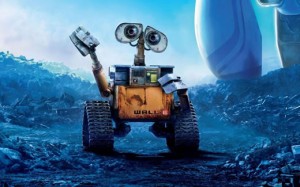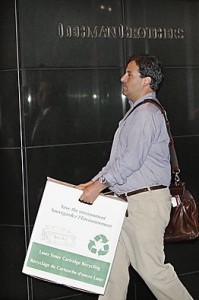Consumer Culture, Creator Culture
 On June 23, 2008, Pixar released WALL-E, a science fiction movie which predicted that humankind’s ultimate fate would be morbid obesity. In the movie, we retreat into space in technological wombs, leaving behind on Earth a planet-wide landfill, residue of our consumer culture, until we are rescued by a sentient robot that somehow restores our will-to-work.
On June 23, 2008, Pixar released WALL-E, a science fiction movie which predicted that humankind’s ultimate fate would be morbid obesity. In the movie, we retreat into space in technological wombs, leaving behind on Earth a planet-wide landfill, residue of our consumer culture, until we are rescued by a sentient robot that somehow restores our will-to-work.
WALL-E‘s premise was a reasonable attempt to forward-project cultural trends. Throughout most of the 20th century, America lived in a world of cheap calories and mass-produced content: a TV next to an Iowa cornfield. We stuffed our faces with food and our minds with reality shows, and it’s not too crazy a leap to extrapolate from that to couch-potato apocalypse. But today, that vision of the end seems as archaic as World World II propaganda showing Hitler marching through downtown Chicago.
 There are two representative events that make me think that the world might end in fire, or it might end in ice, but it won’t end in lard. One was in September of 2006: Facebook released News Feed and Liking, and in literally under 24 hours, a hundred thousand people joined a group to protest; ironically, the rapid mobilization was made possible by the same-said technology, which, slightly modified, is increasingly becoming the basis for a new, participatory internet. The other was in September of 2008: only three months after WALL-E was released, Lehman Brothers collapsed, shattering the illusion that America was on a sustainable economic path. There will never be floating spaceships of the obese, because any civilization that would build them will be too deep in debt to afford it.
There are two representative events that make me think that the world might end in fire, or it might end in ice, but it won’t end in lard. One was in September of 2006: Facebook released News Feed and Liking, and in literally under 24 hours, a hundred thousand people joined a group to protest; ironically, the rapid mobilization was made possible by the same-said technology, which, slightly modified, is increasingly becoming the basis for a new, participatory internet. The other was in September of 2008: only three months after WALL-E was released, Lehman Brothers collapsed, shattering the illusion that America was on a sustainable economic path. There will never be floating spaceships of the obese, because any civilization that would build them will be too deep in debt to afford it.
Although the Lehman collapse, subprime crisis, and ensuing recession were shocks to the system, they are going to look like minor tremors compared to the convulsions coming in the next thirty years. In the Arab world, the revolution has already started, and so far it has been political. I don’t know what it will look like in America but I hope — considering the alternatives — that it will be economic.
Simply put, in a world where the population keeps on expanding, a culture that focuses on consuming is not sustainable. Thomas Malthus infamously predicted that the pressure of population against resources would lead to poverty and death. We now know what actually happens is that humans invent new means for creating wealth. In the past, that creation was largely focused on material goods, and although each burst of wealth disrupted the power structure in society — for instance, the rise of the Rockefellers on a wave of oil — things quickly settled back into equilibrium. Now, the medium of creation is information, the creators are everywhere, and there are too many of them for the cultural elite to assimilate them all.
We are surrounded by the walking dead. Blockbuster CEO Jim Keyes was quoted in 2008 saying “I’ve been frankly confused by this fascination that everybody has with Netflix.” Everyone laughs at that now after Netflix drove his company into bankruptcy, but that was just a foretaste of the economic disruptions ahead. Across every industry, the barriers to entry are dropping: making and distributing movies (cellphones + YouTube), building software (python/ruby + amazon web services), journalism (wordpress + twitter)… Even in “hard” industries like manufacturing, you can start to see the beginnings of the end. As the barriers to entry go down, the creators start kicking out the landlords. It becomes harder and harder to sit on your ass and collect rent; to survive, you have to create value for other people.
 Success in a creation economy requires a different set of characteristics than success in a consumer economy. Authenticity becomes more important than presentation. Speed becomes more important than size. Personal responsibility becomes more important than office politics. Pointy-haired boss better hope he has a good retirement plan. There is going to be, there already is, a fundamental shift in power into the hands of the people who master the tools of the new mediums. The revolution will not be televised, but it will probably happen on Apple hardware. And the people who create are not going to be satisfied seeing the results of their labor fed back into the black hole of the federal healthcare budget.
Success in a creation economy requires a different set of characteristics than success in a consumer economy. Authenticity becomes more important than presentation. Speed becomes more important than size. Personal responsibility becomes more important than office politics. Pointy-haired boss better hope he has a good retirement plan. There is going to be, there already is, a fundamental shift in power into the hands of the people who master the tools of the new mediums. The revolution will not be televised, but it will probably happen on Apple hardware. And the people who create are not going to be satisfied seeing the results of their labor fed back into the black hole of the federal healthcare budget.
 Every generation is a historical anomoly. The great anomoly of the 20th century was the utter lack of demands placed on the citizens of first-world countries. To pick an extreme example at the other end of the spectrum, the citizens of Sparta in ancient Greece were expected to maintain superb physical health and athletic fitness, devote their lives to training for combat, and endure a life of austerity and hardship; in exchange, their civilization became one of the great powers of the ancient world. The rigors that will be required for economic survival in the next few decades will be different — less obedience and conformity, more creativity and vision — but the fact is, the bar is going to be raised and not everyone will make the cut.
Every generation is a historical anomoly. The great anomoly of the 20th century was the utter lack of demands placed on the citizens of first-world countries. To pick an extreme example at the other end of the spectrum, the citizens of Sparta in ancient Greece were expected to maintain superb physical health and athletic fitness, devote their lives to training for combat, and endure a life of austerity and hardship; in exchange, their civilization became one of the great powers of the ancient world. The rigors that will be required for economic survival in the next few decades will be different — less obedience and conformity, more creativity and vision — but the fact is, the bar is going to be raised and not everyone will make the cut.
Losing weight isn’t easy. We have an education system, a political system, an agricultural system, and of course an economic system that have all been optimized to satisfy the basic material comforts of as many voters as possible, as well as the extended material comforts of a somewhat smaller subset. In other words, we are trained and groomed from birth to be fat, lazy and dumb. This is the world we built for ourselves; this is the fruit of our ancestor’s success. We got here with good intentions, but it’s a local maximum, not a global maximum, and therefore it’s a trap. Escaping from a local maximum is hard to do on your own. The more people who make it out, the easier it will be for us as a whole to ride the transition from a consumer culture to a creator culture succesfully.
 I like the announcement they make on airplanes: put on your own oxygen mask first, then help the people around you. I don’t think we’ll crash, but we may experience sudden shifts in cabin pressure. So, if you don’t know where the oxygen masks are, the time to start looking around is now…
I like the announcement they make on airplanes: put on your own oxygen mask first, then help the people around you. I don’t think we’ll crash, but we may experience sudden shifts in cabin pressure. So, if you don’t know where the oxygen masks are, the time to start looking around is now…